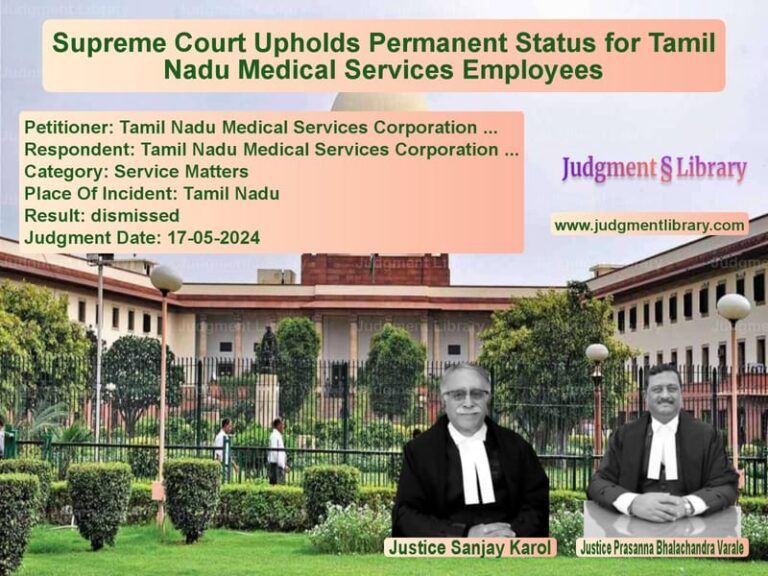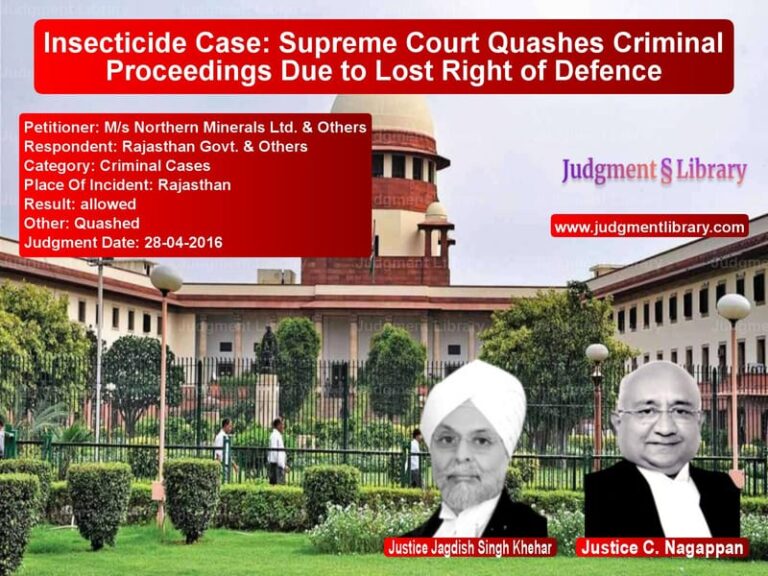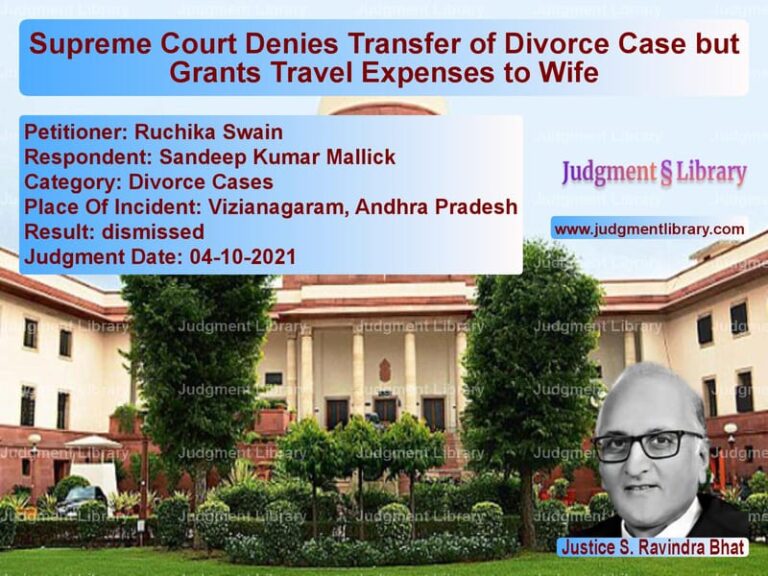Rajasthan Government Job Seniority Dispute: Supreme Court Restores Disabled Teacher’s Rights
The case of Net Ram Yadav vs. The State of Rajasthan & Ors. revolves around the wrongful downgrading of a physically disabled government teacher’s seniority after his transfer to his home district. The Supreme Court ruled in favor of the appellant, setting aside the Rajasthan High Court’s judgment and restoring his original seniority.
Background of the Case
The appellant, Net Ram Yadav, was a physically handicapped candidate belonging to the OBC category. He was appointed as a Senior Teacher in the Rajasthan Education Department through a direct competitive examination in 1993. His service was governed by the Rajasthan Educational Subordinate Service Rules, 1971.
Due to his physical disability, the appellant requested a transfer to his home district under a 2000 circular that allowed disabled employees to be posted near their residence. His request was granted, and he was transferred from Hanumangarh to Alwar in 2002. However, in 2007, his name was removed from the state seniority list, and his seniority was downgraded.
The appellant challenged this decision before the Rajasthan High Court, arguing that his transfer was on administrative grounds and should not have affected his seniority.
Legal Issues Before the Court
The Supreme Court had to determine:
- Whether the appellant’s transfer under the disability policy affected his seniority.
- Whether the Rajasthan government violated Article 14 of the Constitution by treating a physically disabled candidate unfairly.
- Whether the High Court erred in upholding the reduction of the appellant’s seniority.
Arguments Presented
Petitioner’s (Appellant’s) Arguments
- The appellant contended that his transfer was granted under a government circular aimed at helping disabled employees, and thus it should not affect his seniority.
- He argued that he was never informed that accepting the transfer would result in loss of seniority.
- He cited the United Nations Convention on the Rights of Persons with Disabilities (UNCRPD), which India has ratified, stating that disabled persons are entitled to special protection.
- The petitioner claimed that the Rajasthan government’s decision violated the constitutional right to equality under Article 14.
Respondents’ (State of Rajasthan’s) Arguments
- The Rajasthan government contended that under Rule 29 of the Rajasthan Educational Service Rules, 1971, a government employee who requests a transfer loses their seniority.
- The government argued that the 2000 circular applied only to new appointments, not to transfers of existing employees.
- It maintained that since the transfer was requested by the appellant, he was correctly placed at the bottom of the seniority list in the new district.
Supreme Court’s Observations
On the Nature of the Transfer
The Supreme Court, comprising Justice Indira Banerjee and Justice J.K. Maheshwari, held that the appellant’s transfer was made under a government policy aimed at helping disabled persons and should not have resulted in a loss of seniority.
“Physically disabled persons cannot be put at a disadvantage for availing a benefit that was granted to them as a matter of right under government policy.”
On the Applicability of Rule 29
The Court held that Rule 29 of the 1971 Rules, which governs seniority after transfer, was not applicable in this case because the appellant’s transfer was not a regular request-based transfer but one granted under a special policy.
“The loss of seniority under Rule 29 applies to transfers requested by an employee for personal reasons. A transfer under a government policy benefiting the disabled cannot be equated with voluntary transfers.”
On the Violation of Constitutional Rights
The Court ruled that the government’s action in downgrading the appellant’s seniority violated Articles 14, 16, and 21 of the Constitution, which guarantee equality, protection against discrimination, and the right to live with dignity.
“The principle of equality means treating equals equally and unequals unequally. The government’s action of downgrading the appellant’s seniority, despite his physical disability, is discriminatory and unconstitutional.”
On the United Nations Convention on the Rights of Persons with Disabilities (UNCRPD)
The Court referred to the UNCRPD, which India has ratified, and held that the government must ensure that disabled persons are not placed at a disadvantage due to their disability.
“International conventions ratified by India must be respected. The rights of disabled persons under the UNCRPD include protection against discrimination in employment.”
Judgment and Its Implications
The Supreme Court ruled in favor of the appellant and set aside the Rajasthan High Court’s decision. The key directives of the judgment were:
- The Rajasthan government was ordered to restore the appellant’s original seniority.
- The 2007 government order that downgraded the appellant’s seniority was declared illegal and quashed.
- The Court directed all government authorities to ensure that transfers under disability policies do not lead to adverse employment consequences.
Significance of the Judgment
- Protects Disabled Employees: The ruling ensures that disabled government employees are not unfairly penalized for availing benefits under government policies.
- Upholds Constitutional Rights: The judgment reinforces that government actions must comply with Articles 14, 16, and 21 of the Constitution.
- Strengthens Employment Protection for the Disabled: The decision establishes that special accommodations for disabled persons cannot result in career disadvantages.
Conclusion
The Supreme Court’s ruling in Net Ram Yadav vs. The State of Rajasthan & Ors. is a landmark judgment that upholds the rights of disabled employees. By restoring the appellant’s seniority, the Court has ensured that government policies for the disabled are implemented fairly and without discrimination. This judgment sets a crucial precedent for future cases involving employment rights for persons with disabilities in India.
Petitioner Name: Net Ram Yadav.Respondent Name: The State of Rajasthan & Ors..Judgment By: Justice Indira Banerjee, Justice J.K. Maheshwari.Place Of Incident: Rajasthan.Judgment Date: 10-08-2022.
Don’t miss out on the full details! Download the complete judgment in PDF format below and gain valuable insights instantly!
Download Judgment: net-ram-yadav-vs-the-state-of-rajasth-supreme-court-of-india-judgment-dated-10-08-2022.pdf
Directly Download Judgment: Directly download this Judgment
See all petitions in Employment Disputes
See all petitions in Public Sector Employees
See all petitions in Transfers Cases
See all petitions in Judgment by Indira Banerjee
See all petitions in Judgment by J.K. Maheshwari
See all petitions in allowed
See all petitions in Quashed
See all petitions in supreme court of India judgments August 2022
See all petitions in 2022 judgments
See all posts in Service Matters Category
See all allowed petitions in Service Matters Category
See all Dismissed petitions in Service Matters Category
See all partially allowed petitions in Service Matters Category







